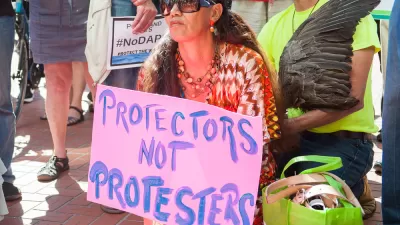President Biden's executive order may put the final nail in the coffin of the controversial pipeline project, but it was unwavering local activists who kept the pressure on for a decade.

The Keystone XL pipeline, which, along with the Dakota Access Pipeline, became a buzzword and a political lightning rod during the Trump administration, may finally be dead thanks to an executive order signed by President Biden rescinding a prior permit. But, according to Yessenia Funes writing for Atmos, it is the frontline Indigenous organizers, working tirelessly for the last ten years to stop the project, that deserve the real credit.
Since 2011, Joye Braun has been a key part of the fight against the pipeline. In the beginning, residents like her primarily worried about protecting important waterways and sacred lands. Since then, climate change and greenhouse gas emissions have become urgent global concerns. "Braun has seen former President Barack Obama (with Biden alongside him) kill the 1,179-mile pipeline only to see Trump resurrect it. That’s why she calls it a 'zombie pipeline.'"
Activists are cautiously optimistic that Biden's action will stop the pipeline for good. "Tribal nations in the U.S. are sovereign nations with treaty rights. All they ask is that the federal government and private companies treat them as such and leave their water and lands alone."
FULL STORY: RIP Keystone XL

Planetizen Federal Action Tracker
A weekly monitor of how Trump’s orders and actions are impacting planners and planning in America.

Restaurant Patios Were a Pandemic Win — Why Were They so Hard to Keep?
Social distancing requirements and changes in travel patterns prompted cities to pilot new uses for street and sidewalk space. Then it got complicated.

Maui's Vacation Rental Debate Turns Ugly
Verbal attacks, misinformation campaigns and fistfights plague a high-stakes debate to convert thousands of vacation rentals into long-term housing.

In California Battle of Housing vs. Environment, Housing Just Won
A new state law significantly limits the power of CEQA, an environmental review law that served as a powerful tool for blocking new development.

Boulder Eliminates Parking Minimums Citywide
Officials estimate the cost of building a single underground parking space at up to $100,000.

Orange County, Florida Adopts Largest US “Sprawl Repair” Code
The ‘Orange Code’ seeks to rectify decades of sprawl-inducing, car-oriented development.
Urban Design for Planners 1: Software Tools
This six-course series explores essential urban design concepts using open source software and equips planners with the tools they need to participate fully in the urban design process.
Planning for Universal Design
Learn the tools for implementing Universal Design in planning regulations.
Heyer Gruel & Associates PA
JM Goldson LLC
Custer County Colorado
City of Camden Redevelopment Agency
City of Astoria
Transportation Research & Education Center (TREC) at Portland State University
Jefferson Parish Government
Camden Redevelopment Agency
City of Claremont





























